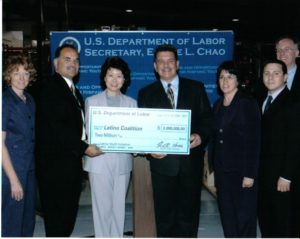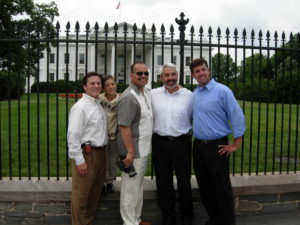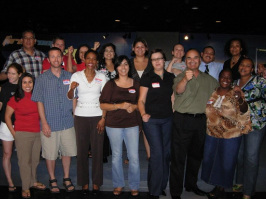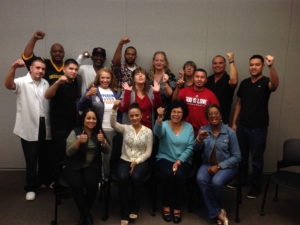In April 2003 a national grant writing seminar was held in Los Angeles, sponsored by SAMHSA and the California Hispanic Commission for Alcohol and Drug Abuse. An informal poll was taken amongst the 125 Latino community based organizations in attendance, asking the question about the need for an effort to form a Latino focused organization that could provide technical assistance in various areas to help Latino community based organizations gain access to Federal and State funding. The response was an overwhelming affirmation that such an organization was needed to put the voice of these organizations at the table as legitimate social service providers deserving an equal chance to compete for public funds. With this mandate the Latino Coalition for Community Leadership (LCCL) was born.
2004
In 2004 LCCL received its first $10 million award from the US Department of Labor – Employment and Training Administration (DOL/ETA). This three-year, $10,000,000 grant supported 28 organizations in Denver, Dallas, Houston, Phoenix, Los Angeles, and San Diego in developing and delivering educational and workforce development-related services for 2,000 Latino adjudicated and at-risk youth annually.
2005
In 2005 LCCL was awarded a Compassion Capitol Fund (CCF) grant from the Administration for Children and Families (ACF) for $978,551. The CCF Project supported the role of Latino community based organizations in addressing the causes and consequences of youth gang involvement. A total of $400,000 was given in sub-awards to 44 nonprofits. In addition to the grant awards, the Latino Coalition provided training, technical assistance and expanded its reach to three new cities; Bakersfield, California, Portland, Oregon, and Hartford, Connecticut.
In 2007 LCCL received a two and a half year, 1.3 million grant from the Office of Juvenile Justice Delinquency Prevention (OJJDP).The project focused on advancing the mobilization and support of Latino-serving community-based organizations in three cities with large Latino populations. The Latino Coalition provided grants averaging $140,000 to a cohort of 12 FBCOs (4 in Denver, 4 in Los Angeles and 4 in Phoenix) to serve 480 at-risk and adjudicated youth each year over the course of the project period totaling $1,680,000 (two-year project period for direct service). In addition LCCL conducted train-the-trainer and technical assistance to train 75 parents/community leaders each year (150 over the two year program project period) in “Parents on a Mission” – a curriculum to teach parents in the community how to prevent youth involvement in gangs or other negative lifestyles.
**In October of 2012 LCCL was awarded it’s second $10 million from DOL/ETA. The focus of the project, Work and Gain Education & Employability (WAGEES), is to provide employability, education and supportive services to young offenders and high school dropouts between the ages of 18-24 residing in or returning to the high-poverty, high-crime communities.
It is anticipated that project will fund 15 sub-grants equally distributed in Buffalo, New York; Denver, Colorado and Los Angeles, California. The average sub-grant award will be approximately $200,000 per year for up to two years based on performance (total of $400,000). Sub-grantees must serve at least 75 participants annually with the comprehensive services outlined in this document. The purpose of the grants is to prepare these individuals for employment, by increasing the employment rate of participants, decreasing the recidivism rate of young offenders served, increasing the rate at which participants receive high school diplomas and industry-recognized credentials and increasing the rate at which participants enter post-secondary education and training. In addition to the sub-grantee’s own services, they will coordinate with two project vendors providing hard skills training in high-demand occupations and “green jobs” for up to 33% of participants. The vendors are funded under a separate agreement and do not come out of sub-grantee funds.




